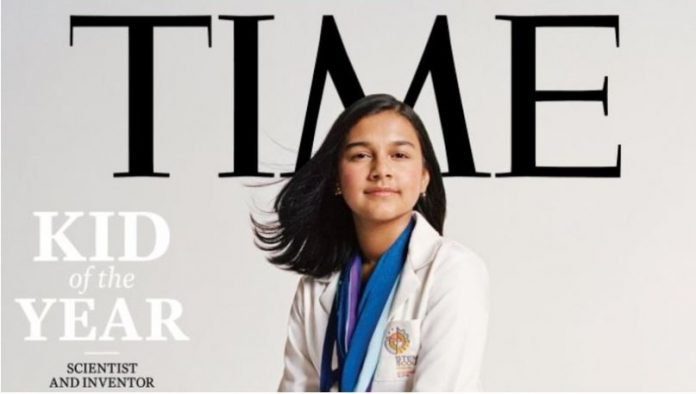“I was 10 when I told my parents I wanted to research carbon nanotube sensor technology. My mom was like what?” said Gitanjali Rao
At only 15, Gitanjali Rao has been selected from a field of more than 5,000 US nominees as TIME’s first ever Kid of the Year.
Rao’s astonishing work includes using technology to tackle issues ranging from contaminated drinking water to opioid addiction and cyberbullying, with her mission to create a global community of young innovators to solve problems the world over standing out as an inspiration to many.
“I was like 10 when I told my parents that I wanted to research carbon nanotube sensor technology at the Denver Water quality research lab, and my mom was like, A what?” the young scientist told actor and activist Angelina Jolie in an interview over Zoom from her home in Colorado.
“I’m a very curious person if there’s one thing you need to know about me. I just love learning about the environment, the ecology, I just like learning in general so everything in school is super fun,” she revealed, saying she cannot see a world filled with kindness without science and technology being involved.
One of her latest innovations, an app called Kindly, is here to help prevent cyberbullying.
“I started to hard-code in some words that could be considered bullying, and then my engine took those words and identified words that are similar,” Rao revealed, talking about how the app worked.
“You type in a word or phrase, and it’s able to pick it up if it’s bullying, and it gives you the option to edit it or send it the way it is. The goal is not to punish. As a teenager, I know teenagers tend to lash out sometimes. Instead, it gives you the chance to rethink what you’re saying so that you know what to do next time around.”
In a way, Gitanjali thinks this is not micro-managing teenagers but instead giving them an opportunity to learn from their mistakes.
She also spoke about how her goal had shifted not only from creating her own devices to solve the world’s problems, but inspiring others to do the same as well, since she wanted to see more people like her in the field.
“I don’t look like your typical scientist. Everything I see on TV is that it’s an older, usually white man as a scientist. It’s weird to me that it was almost like people had assigned roles, regarding like their gender, their age, the color of their skin.”
“It’s not easy when you don’t see anyone else like you. So I really want to put out the message that If I can do it, you can do it, and anyone can do it.”
Gitanjali also revealed currently working on an easy way to help detect bio-contaminants in water—things like parasites.
“I’m hoping for this to be something that’s inexpensive and accurate so that people in third-world countries can identify what’s in their water.”
“I recently hit my goal of 30,000 students who I have mentored, which is super exciting. It’s like creating a community of innovators. I really hope the work that all of these kids are doing identifies innovation as a necessity and not something that’s a choice anymore. I hope I can be a small part of that.”
Rao also has an inspiring message for other youngsters: “Don’t try to fix every problem, just focus on one that excites you.”

















